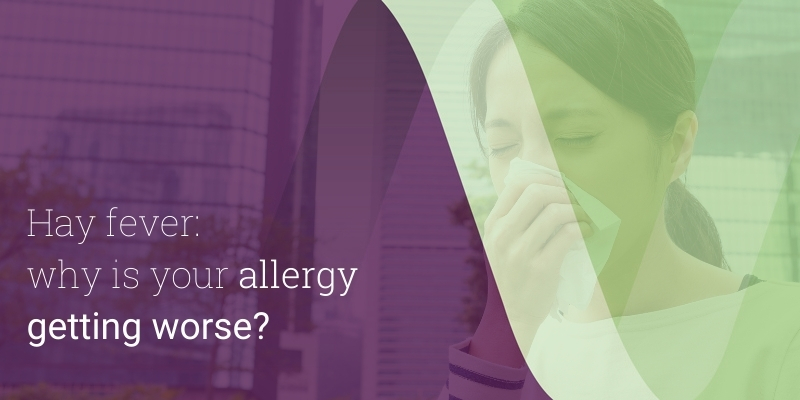
Hay fever is getting more widespread than ever. Symptoms can make you feel miserable and affect your work life, but also your spare time, physical activities, travels and general wellbeing. But why does it feel like it’s getting worse every year? New Victoria Hospital’s GP, Dr Kirsty Schmidt, talks about the symptoms of allergic rhinitis and conjunctivitis and therapies to help you get through pollen season and enjoy your summer.
What is hay fever?
Hay fever is an excessive immune response to airborne allergens such as pollens, dust or pet hair. Hay fever symptoms can be similar to a cold:
- runny nose
- itchy or red eyes
- sneezing
- cough
- itchy nose or throat
- fatigue
What type of pollen allergy do you have?
There are three main types of pollen: tree, grass and weed.
They are active at different times of the year. Tree pollen usually causes symptoms from March to May, grass pollen is more prevalent from May to July and weeds later in the year, from June to September.
If you know what your triggers are it can help you to be prepared.
Why is your hay fever getting worse?
Hay fever affects over 400 million people worldwide and numbers are increasing.
More and more people are now suffering with allergies or present more severe symptoms.
But why are pollen allergies becoming so common?
Environmental factors
The growing hay fever prevalence is mainly due to environmental factors:
- Climate change – high and long-lasting temperatures make pollen season last longer
- Carbon dioxide – pollution has been proved to raise the number of pollens present in urban contexts
- Prevalence of male trees and plants – male plants are easier to maintain and that’s why they are more frequently planted in cities, but they release more pollens in the air than female species
Hay fever has very much become an urban phenomenon.
Genetic risk
Environmental factors play a great role in triggering allergies, but genetic risk accounts for about 50% of cases.
A recent Danish study, has discovered 20 new risk genes for a total of 41 responsible for triggering allergic responses.
The same study also found an overlap between risk genes for hay fever and risk genes for autoimmune diseases such as type 1 diabetes, rheumatoid arthritis and inflammatory bowel disease.
What to do if your hay fever symptoms are worsening
Antihistamines
Antihistamines are the first-line treatment when you start to struggle with symptoms.
It’s a tablet that can help with all the symptoms of hay fever in one go and there are several different ones to try but it is always best to talk to your GP or pharmacist to check which one is best suited to you.
Nasal sprays
Steroid nasal sprays can be very helpful if you mainly get nose symptoms like sneezing and itching and are easy to use.
Eye drops
Eye drops can help relieve itchy and sore eyes that often come with hay fever.
You can also take a combination of the medications to get on top of your symptoms if you need.
GP top tips to get through the pollen season
There are also other things that you can do to prevent or weaken your allergic reaction.
Top tips to help reduce your hay fever symptoms:
- Wear sunglasses to protect eyes.
- Try putting some petroleum jelly around your nostrils to trap the pollen.
- Make sure you shower after being outside and change your clothes, or at least rinse your face to remove any pollen.
- When the pollen count is high, try to keep windows and doors shut, especially in the early evening.
- If grass pollen is your trigger, try and avoid walking where the grass is freshly cut.
If you are still struggling with symptoms, have questions or want to discuss other treatments, you can make an appointment with our private GPs. They will be happy to help you and your children cope with symptoms, choose the right treatment and improve your wellbeing.












